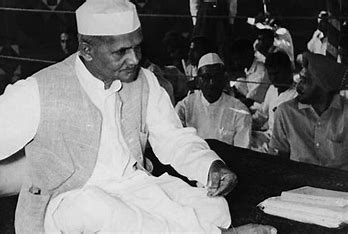New Delhi: Lal Bahadur Shastri’s reformist legacy was evident in his economic team.
As every year, on October 2nd, the nation will respectfully remember Mahatma Gandhi and Lal Bahadur Shastri, the pioneers of self-confidence and the economic revolution in India. Shastri is often remembered for his slogan, “Jai Jawan Jai Kisan”. He is also known for his honesty, sacrifices, and the historic agreement after defeating Pakistan. However, amid the current political and economic changes, would it be wrong to say that Prime Minister Narendra Modi is following Shastri’s path of liberal economic policies, striving for self-sufficiency in food production and the dairy revolution, fortifying national security against Pakistan and China, and rigorously tackling political corruption? Sadly, the Congress party did not accord Shastri the posthumous honour and credit he deserved. It’s a fact that long before Narasimha Rao or Manmohan Singh, Lal Bahadur Shastri initiated the revolutionary shift from socialist, communist-influenced, state-controlled economics towards a liberal, market-driven approach. Thus, it wouldn’t be surprising if Prime Minister Narendra Modi humbly acknowledges that he is working to transform India into a developed nation by following Shastri’s vision, along with Gandhi’s ideals.
Shastri could be regarded as India’s first economic reformer post-Independence. One reason Shastri hasn’t received his due recognition might be the misconceptions surrounding his initial attempts at economic reforms. It’s commonly believed that the decision to devalue the Indian rupee in 1966 was made by Indira Gandhi after becoming Prime Minister. While it’s true that the rupee was devalued during her tenure, records in the Indian government archives show that the decision to devalue the currency, a necessary step, was made during Shastri’s premiership. I.G. Patel, who worked in the Finance Ministry at the time, recalled that the decision was made under Shastri, and informal communication was sent to the International Monetary Fund (IMF). His finance minister, T.T. Krishnamachari, was opposed to devaluation and removing government control over imports and industrial activities. Yet, for Shastri, the post-war economy was in such dire straits that there was no option but to follow IMF and World Bank advice on liberalization and devaluation. So, Shastri found a moral and political way to remove Krishnamachari from his post as finance minister.
Krishnamachari’s departure marked the second time he had to resign from the finance ministry. The first time was during Nehru’s tenure, after the Mundhra scandal. Under Shastri, Krishnamachari’s son faced corruption allegations, and Shastri refused to clear his finance minister of the charges until an investigation by a Supreme Court judge was completed. Krishnamachari took this as an insult and resigned, which Shastri immediately accepted, appointing Sachin Chaudhary as the new finance minister. After Shastri’s sudden passing, Indira Gandhi retained Chaudhary and implemented Shastri’s decision to devalue the currency.
Shastri’s reformist legacy was evident in his economic team, composed of S. Bhoothalingam, Dharma Vira, I.G. Patel, and L.K. Jha, all of whom believed in liberating the economy by modernizing agriculture and granting the private sector relative freedom from state control. Even close associates of Nehru, like Krishna Menon and K.D. Malaviya, had to exit Shastri’s cabinet, signalling that Shastri envisioned an economy less dependent on licence controls and more market-driven.
Shastri’s tenure also brought significant policy shifts. When he assumed office, the failure of the Third Five-Year Plan had become apparent. In August 1965, Shastri announced in Parliament that government control over economic activities would be reconsidered. Shortly thereafter, regulations were relaxed in sectors like steel and cement. Shastri also ordered a review of all major public sector projects that had yet to begin. He sought to decentralize governance by transferring decision-making powers from the Planning Commission to individual ministries. Additionally, he introduced fixed-term contracts for appointments to the Planning Commission and established the National Development Council in 1964 to gain policy insights from experts and reduce the commission’s scope. For Shastri, the solution to food shortages lay in shifting investments to agriculture, while black market issues needed incentives, not pressure
In this light, Rahul Gandhi, Mallikarjun Kharge, and the Congress party should recall Shastri’s policies and decisions. If Krishnamachari resigned over charges against his son, why shouldn’t Karnataka Chief Minister Siddaramaiah step down over allegations of luxury apartments linked to his wife? Ironically, while Congress opposes Amul Dairy’s expansion in certain states today, it was Shastri who initiated the White Revolution, boosting dairy production and launching the National Dairy Development Board with support from Gujarat’s Amul cooperative. Shastri’s efforts laid the foundation for India’s dairy self-sufficiency.
Shastri also accelerated India’s nuclear program to counter China and Pakistan. In October 1964, scientist Homi Bhabha publicly stated that building a nuclear stockpile would cost India only Rs 10 crore. Shastri encouraged Bhabha to continue his work on nuclear explosions for peaceful purposes. Additionally, during the 1965 war with Pakistan, Shastri’s famous slogan, “Jai Jawan, Jai Kisan” united the nation. He appealed for citizens to skip meals to conserve food, a practice he personally followed.
It has been my privilege to interact with Shastri’s sons, Harikrishna, Sunil, and Anil Shastri. Though politics may not have favoured them, they continue to contribute through education and social service, with Sunil Shastri managing the Lal Bahadur Shastri Institute of Management. In his memoirs, Sunil recalls his father’s humble nature, exemplified by a patch of green grass on his office desk, symbolizing a simple yet enduring legacy.
As we remember Gandhi and Shastri on their anniversary, it’s time to renew our commitment to bringing happiness and prosperity to millions, following the path they laid out for us.

